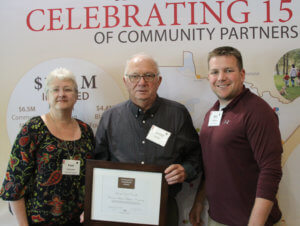 Image: courageous-leadership-award-1500×1000
Image: courageous-leadership-award-1500×1000
Lac qui Parle County and Farmers Mutual Telephone Company
For their vision and innovative partnership that brought fiber optic communications to more than 1700 rural farms and businesses providing a model that has now been replicated in multiple rural Minnesota counties.
- In 2010, approximately 52 percent of all Lac qui Parle residential properties and business properties still depended on dial-up or satellite.
- In 2008, the county’s economic development authority formed a Broadband Steering Committee to study options with the support of a Blandin Foundation broadband feasibility study.
- In 2009, Lac qui Parle partnered with Farmers Mutual Telephone Company, a local telephone cooperative, to expand Internet access. The County and Farmers were awarded a $9.6 million federal grant in August 2010.
Pictured (L to R): Pam Lehmann (former Lac qui Parle EDA director), Harold Solem, Ben Bothun (Lac qui Parle County Commissioner)
Presenting the Award: Pam Lehmann, former executive director of Lac qui Parle EDA
Why is it important that rural Minnesotans have broadband access?
For rural communities to sustain their current residents/businesses, and to find ways to recruit new businesses and new people, we need to be able to offer them not just acceptable levels of digital connection but exceptional levels of digital connections. Rural communities have a fantastic lifestyle that is appealing to many… but technology is a major part of everyone’s daily life/work, so bridging the digital divide with a strong fiberoptic broadband network is a great way to have it all!
What do you see as your biggest broadband victory?
During this project we not only worked on the infrastructure for expanding the fiberoptic network, but we worked in collaboration with several other local, state and national partners to educate our rural communities about how to use the technology. Ten years later our LqP Computer Commuter project is still going strong visiting six rural communities weekly offering free access to broadband, computers and individualized training/assistance.
What role did local leadership play in your accomplishments?
During this period, the LqP County EDA Board of Directors was focused on working together to find projects that could lead our county into a new era of prosperity. We wanted to show that our rural county was a great place for not only enjoying the lifestyle, but a fantastic place for any business to be competitive on a global scale with a significant investment in this fiberoptic network. County leaders worked in collaboration with Farmers Mutual Telephone Company to make a historic financial commitment to spread fiberoptic broadband service to our homes and businesses.
What words of encouragement would you give to community leaders working to improve broadband access?
There is no place too small or too remote – if you are willing to work hard and collaborate with a wide variety of partners, envisioning a robust broadband network can become a reality!
Kevin Beyer, General Manager of Acira Cooperative
Why is it important that rural Minnesotans have broadband access?
Broadband allows rural residents to be connected to the rest of the world, age at home, access lifelong learning and it allows rural industries to thrive. Without broadband connectivity, people are not able to have the same quality of life as those who are connected. Broadband allows people to live in rural AND find meaningful employment.
What do you see as your biggest broadband victory?
I think the biggest victory is those that want to telecommute, can. It’s because of the fiber connectivity, we’re seeing a lot of people working from home. In our community, the beet producers, corn producers, jewelry makers, grain operators, all of them are doing business on the online marketplace. They all have national and international customer bases. Their business is more sustainable because of the connectivity. Anecdotally, we also hear community members say they’re working for colleges, the University of Minnesota, hospitals, and medical companies. There are more options because of our connectivity.
What role did local leadership play in your accomplishments?
It started with the economic develop authority. They recognized that the county needed a broadband plan to thrive in the new digital economy. They worked with the county commissioners to provide funding and time to work out a plan.
It wasn’t just that they knew they needed a plan, but that they put the finances together to make it work. They were active participants and made some concessions for Farmers’ business plan to work.
What words of encouragement would you give to community leaders working to improve broadband access?
It all has to do with the ability to think as a group, as equal partners, to get the project done. Every situation is different, but there’s a way to get it done. Public and private can work together on a long-range goal if both parties understand there needs to be a viable business plan to make it happen. If you can’t figure out what each partner gets out of the deal, it won’t work. So figure that out first.
